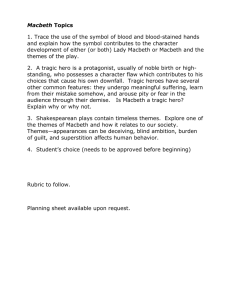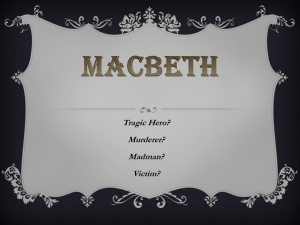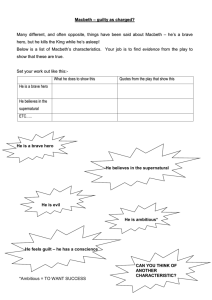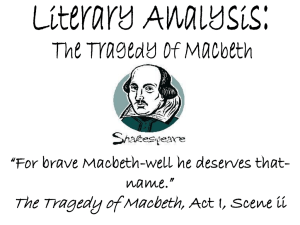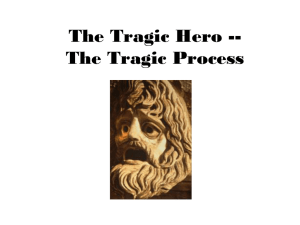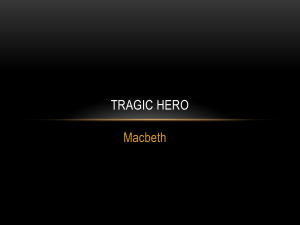Tragic Hero Definition & Macbeth Example | eGallery
advertisement
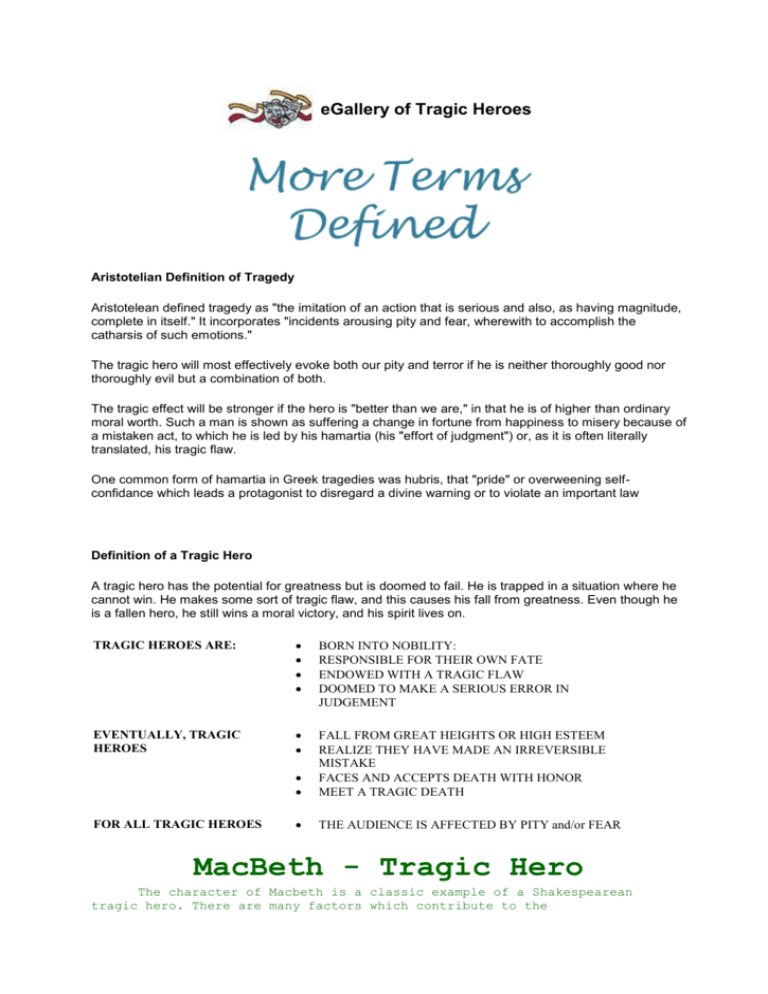
eGallery of Tragic Heroes Aristotelian Definition of Tragedy Aristotelean defined tragedy as "the imitation of an action that is serious and also, as having magnitude, complete in itself." It incorporates "incidents arousing pity and fear, wherewith to accomplish the catharsis of such emotions." The tragic hero will most effectively evoke both our pity and terror if he is neither thoroughly good nor thoroughly evil but a combination of both. The tragic effect will be stronger if the hero is "better than we are," in that he is of higher than ordinary moral worth. Such a man is shown as suffering a change in fortune from happiness to misery because of a mistaken act, to which he is led by his hamartia (his "effort of judgment") or, as it is often literally translated, his tragic flaw. One common form of hamartia in Greek tragedies was hubris, that "pride" or overweening selfconfidance which leads a protagonist to disregard a divine warning or to violate an important law Definition of a Tragic Hero A tragic hero has the potential for greatness but is doomed to fail. He is trapped in a situation where he cannot win. He makes some sort of tragic flaw, and this causes his fall from greatness. Even though he is a fallen hero, he still wins a moral victory, and his spirit lives on. TRAGIC HEROES ARE: BORN INTO NOBILITY: RESPONSIBLE FOR THEIR OWN FATE ENDOWED WITH A TRAGIC FLAW DOOMED TO MAKE A SERIOUS ERROR IN JUDGEMENT EVENTUALLY, TRAGIC HEROES FALL FROM GREAT HEIGHTS OR HIGH ESTEEM REALIZE THEY HAVE MADE AN IRREVERSIBLE MISTAKE FACES AND ACCEPTS DEATH WITH HONOR MEET A TRAGIC DEATH THE AUDIENCE IS AFFECTED BY PITY and/or FEAR FOR ALL TRAGIC HEROES MacBeth - Tragic Hero The character of Macbeth is a classic example of a Shakespearean tragic hero. There are many factors which contribute to the degeneration of Macbeth of which three will be discussed. The three points which contribute greatly to Macbeth's degeneration are the prophecy which was told to him by the witches, how Lady Macbeth influenced and manipulated Macbeth's judgment, and finally Macbeth's long time ambition which drove his desire to be king. Macbeth's growing character degenerates from a noble man to violent individual. The prophecies which were told by the witches were one of the factors which contributed to the degeneration of his character. If it had not been for the witches telling him that he was to be Thane of Cawdor, Thane of Glamis, and King of Scotland, Macbeth would still be his ordinary self. As a result of the prophecies, this aroused Macbeth's curiosity of how he could be King of Scotland. As the play progresses, Macbeth slowly relies on the witches prophecies. Shakespeare uses the witches as a remedy for Macbeth's curiosity which corrupts his character. The influence of Macbeth's wife, Lady Macbeth also contributed to his degeneration of character. Lady Macbeth's character in the beginning reveals that she is a lovable person. When Lady Macbeth was ready to kill King Duncan herself, it showed that Lady Macbeth could not murder King Duncan because he reminded her of her father. This proves that Lady Macbeth has a heart deep inside her. Lady Macbeth plays an important role in this play because she provided a scheme which caused Macbeth to assassinate King Duncan. After Macbeth had killed King Duncan, he later regrets on his wrong doing. At the point of this play the audience can note the change in Macbeth's character. Macbeth's first murder was a trying experience for him, however after the first murder, killing seemed to be the only solution to maintain his reign of the people of Scotland. Therefore, it was Lady Macbeth who introduced the concept of murder to Macbeth. Macbeth's ambition also influenced his declining character. However, Macbeth's ambition had not been strong enough to carry the motive to kill King Duncan. Lady Macbeth's influence also comes in to play because if not for Lady Macbeth, his ambition would not have been intensified enough to drive him to obtain and maintain his title of King of Scotland no matter what it took, even if it meant murdering. Macbeth's ambition influenced the cause of his new character. This new character of Macbeth contained greed, violence, and power hunger. Macbeth shows this when he kills King Duncan. In conclusion, the prophecies given to him by the witches, Lady Macbeth's influence and plan, and his intensified ambition, all contributed greatly to his degeneration of character which resulted to his downfall...death. Therefore Macbeth character displays strong signs of a tragic hero, making him the ideal classic example. Tragic hero From Wikipedia, the free encyclopedia. Jump to: navigation, search A tragic hero is an honorable man/woman/pigdog protagonist with a tragic flaw, also known as fatal flaw, which eventually leads to his demise. The concept of the tragic hero was created in ancient Greek tragedy and defined by Aristotle. In fact, an Aristotelian tragic hero must have four characteristics: goodness, superiority (in terms of politics, reputation, or perceived wisdom, etc.), a tragic flaw, and a realization of both his flaw and his inevitable demise. Usually, the realization of fatal flaw results in catharsis or epiphany. Contents [hide] 1 Classical tragic hero 2 The modern tragic hero 3 Competing concepts of the tragic hero 4 See also [edit] Classical tragic hero The works of Antigone and Oedipus Rex are examples of the flaw of hubris, or pride. Many plays have followed Aristotle's idea of the tragic hero, but William Shakespeare was considered the playwright who helped extend the idea of the tragic hero beyond a flaw of making an error in judgment (as in Oedipus trying to escape his fate only to fulfill it) to the internal conflict of moral argument. While Shakespeare's King Lear and Brutus (of Julius Caesar) are heroes who can be easily applied with the Aristotlean definition, his Hamlet and Macbeth are the two prime tragic heroes where Aristotle's meaning ends and Shakespeare's begins. Hamlet's fatal flaw, as seen by Aristotle, would be his failure to act immediately to kill Claudius. Unlike Oedipus, however, Hamlet is well aware of his fatal flaw from the outset. He constantly questions himself on why he continues to delay the fulfillment of his duty. In doing so, his continuous awareness and doubt (e.g. using the play-within-the-play to make sure the Ghost was telling the truth) incapacitates him from acting. Hamlet finally acts to kill Claudius only after realizing that he is poisoned. But by procrastinating, everyone whom he ridicules and targets also dies along the way, such as Laertes, Gertrude, Polonius, Ophelia, Rosencrantz, and Guildenstern. Macbeth, however, presents a problem; whereas in Hamlet, we are made to feel some degree of empathy or sorrow for the hero because of the loss of his father and his mother's marriage to his uncle, Macbeth as the hero arouses little pity or feeling. His tragic flaw is that of being power-hungry, conniving, and utterly amoral when the opportunity suits him (note how in Act III, Scene I the third murderer is not present at Macbeth's briefing and yet in Act III, Scene III he is more informed than the other two murderers on what they are about to do). Macbeth does not possess two of the qualifying factors for a "traditional" tragic hero. He lacks goodness; he is also not superior, having been referred to by other thanes as a tyrant and an incompetent ruler during his kingship. At the beginning of the play however Macbeth is viewed as great, when he is being described as superior in battle by the Sergeant and when described by Duncan. [edit] The modern tragic hero In the Modernist era, a new kind of tragic hero was synthesized as a reaction to the English Renaissance, The Age of Enlightenment, and Romanticism. The idea was that the hero, rather than falling calamitously from a high position, is actually a person less worthy of consideration. Not only that, the protagonist may not even have the needed catharsis to bring the story to a close. He may die without an epiphany of his destiny, or suffer without the ability to change events that are happening to him. The story may end without closure and even without the death of the hero. This new tragic hero of Modernism is the anti-hero. Two of many examples of the anti-hero in modern literature are Willy Loman from Death of a Salesman by Arthur Miller and James Gatz from The Great Gatsby by F. Scott Fitzgerald. Edith Wharton's Ethan Frome is another example of the tragic anti-hero. Ethan, the protagonist, is married to Zeena, but falls in love with Mattie, Zeena's cousin, when she comes over to live with them. As a character, Zeena is sickly and unbendingly cruel. Her coldness to Ethan drives him to Mattie. The love between Mattie and Ethan grows, but they are unable to act on their feelings. The setting in which Ethan and Mattie are trapped, presented as raging winter blizzard that denies both entrance and exit, drives both of them to try to commit suicide by sledding down and hitting an elm tree. A true and cathartic tragedy would have been for both of them to die like Romeo and Juliet, but as this is a story of the anti-hero, Mattie and Ethan continue to live, but crippled. Ethan has a limp, and Mattie is paralyzed from the neck down. Now Zeena has somehow recovered enough from her sickness to take care of them. This reversal of fortune is considered ironic: Ethan used to take care of Zeena but would rather avoid her; by the end of the story, Zeena is taking care of Ethan and Mattie and enjoys being their caretaker. Moreover, another irony is that winter is over, but Ethan and Mattie remained trapped. This time, it is not the blizzard but their physical conditions that trap them, forever reminding of their mistakes. [edit] Competing concepts of the tragic hero A tragic hero was considered to need a catharsis, or a moment of emotional purgation, but it comes at a time when it is too late to change the course of events already in motion. Each new era of literature brings new definitions of what a hero must be in a tragedy. Aristotle's definition remains the yardstick against which all other forms of heroes are measured. Some other common traits characteristic of a tragic hero: [edit] He/she must suffer. He/she must be doomed from the start. He/she must be fundamentally noble in nature. His/her story should arouse fear and empathy. "Star-crossed" to meet a particular fate. Physically or spiritually wounded by his experiences (ie Post-traumatic stress disorder)
